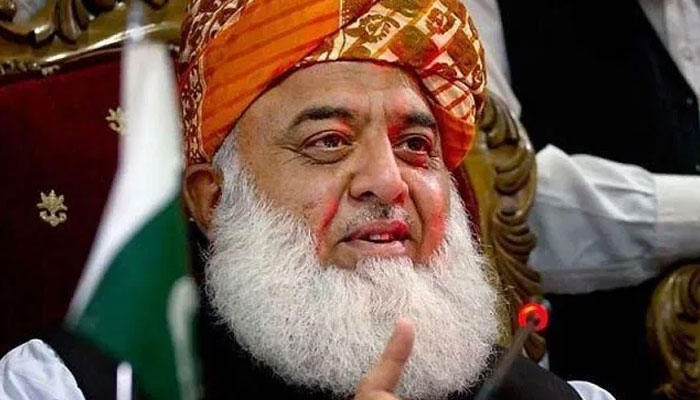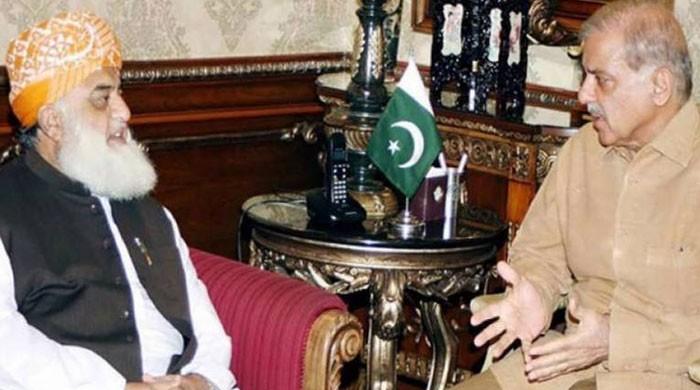Maulana’s second coming
Maulana, for once, should thank his arch-enemy for reviving his political fortunes. Kaptaan has one again put Maulana at the centre-stage of Pakistan’s politics, just as Musharraf had done two decades ago.
While Musharraf knew what he was doing, for Kaptaan it is an unintended consequence of his political ambitions. Can it help the PTI understand that suppression of mainstream parties does not make the ruling party invincible? It merely opens opportunities for religious forces that cannot be subdued in the same way. In an arena that was emptied of rivals, the PTI is facing a different kind of challenger – an enemy against whom it is extremely vulnerable.
Only a year ago, Maulana was written off as history. Kaptaan had defeated him decisively in his own fortress, snatching from him many of his bearded voters while ridiculing him in public meetings. Kaptaan, at that time, was more extreme right than Maulana. Maulana appeared clueless against Kaptaan. He had to put up with the kind of humiliation he had never faced in his life.
But the wily Maulana knows the martial art of survival better than any other politician in this country. The PTI saw his realpolitik as his major weaknesses, claiming that he was a spineless opportunist. True, Maulana has never sacrificed a political opportunity for the sake of ideology or principles. However, the realpolitik does not exclude the scope of confrontation from politics. It merely means fighting when it suits your political ends and lying low when discretion is the better part of valour.
It is a huge mistake to judge an enemy by his psychology or intentions. An enemy must be judged by his capability, because intentions can change and no judgements can be made on the shifting sands of psychology. After a very long time, Maulana has found that confrontation suits his political ends best and Maulana is capable of a lot of munificence.
Related: JUI-F’s dual policy frustrates Jiyalas: PPP
During Maulana’s era of politics, religious parties have witnessed stagnation and decline. The Jamaat-e-Islami, once Pakistan’s most influential religio-political party, bankrupted itself by supporting Zia martial law, lost it fortress, Karachi, to the MQM and became a ghost of its earlier self. Today’s JI is a senior branch of its own student wing, comprising boys in beards – black, grey and henna-dyed red. Another major political party, the Jamiat-Ulema-e-Pakistan, representing Barelvi politics, died a slow and painful death.
Maulana joined politics in 1981 after his father’s demise. There was no scope for a young man in his twenties to lead the party of Ulema firmly embedded in the gerontocracy of senior scholars who represented the powerful Deobandi Madressah Movement. A young Maulana successfully outfoxed and defeated greybeard claimants to his father’s throne. His comrades smilingly narrate how Maulana almost forced a reluctant Zia to arrest him because he wanted to be taken seriously.
Maulana started his politics as a democrat, a member of the anti-martial law political alliance. As democracy was revived, he joined the game of politics of patronage. He allied himself with successive governments, striking a tough bargain every time to ensure patronage for his supporters. This strategy might have soiled his name, but it ensured the relevance and survival of his party.
Maulana reached the pinnacle of his power and influence when Musharraf banished the two major political players, Benazir Bhutto and Nawaz Sharif, from the country and engineered the fragmentation of their parties. Maulana tried to fill the vacuum by joining hands with Musharraf.
While chanting the mantra of enlightened moderation, Musharraf created a perfect environment for religious politics to flourish because he wanted to hurl the “after me Mullahs” threat to the West. He also wanted to neutralize the religious opposition while he adopted pro-Western policies and joined the US ‘war on terror’. Religious parties were also his hedge against mainstream political parties who were infected with the democracy bug.
Maulana became the leader of the opposition, even though the PPP was the largest party on the opposition benches. Maulana’s nominee was elected chief minister of Khyber Pakhtunkhwa and the MMA formed government in Balochistan as well.
A decade of democracy has diminished Maulana’s relevance. He had been defeated before, but the last election saw him humiliated as well. He has lost a share in power, which means that he will not be able to share spoils with his followers for some time. He has also sensed that adopting a soft approach on the lines of Zardari and Shahbaz Sharif will only make him vulnerable to Kaptaan’s mischiefs.
What is even more important is that the arena is empty of rivals to the champion. Maulana knows that no arena belongs to the champion alone and glory always awaits the challenger. He has everything to gain from being the mortal challenger to his humiliator. He gains if other parties follow him as it makes him the leader of the opposition. He gains even more if other political parties try to swim without getting wet, as the PPP is trying to do, mistaking low level of cleverness for strategy. In this case, he will become the sole challenger to the incumbent prime minister.
Maulana has the intention to throw the devil at the PTI. He is the only leader who is fully resolved to give Kaptaan a taste of his own medicine. He is rallying his core and, unlike other opposition parties, he has no qualms in using religion against his opponent.
The wily Maulana understands the vulnerabilities of the regime and he can smell blood. He knows that Pakistan is obliged to do something about madressahs and many religious groups. Any serious challenge from the religious lobby can undermine action against proscribed organizations and mainstreaming of madressahs. Maulana is already portraying the process as a sell out to the West.
Maulana also knows that the bazaar is on his side because the government is resolved to document the economy and wants to make traders pay taxes. The alliance of the Bazaar and the Madressah can be a deadly one, never formed since the 1977 movement against Bhutto – though the bazaar has always been a main contributor to mosques, madressahs and even extremist organizations.
Will Kaptaan understand that the political arena can never the emptied of rivals, unless he can really hang 500 political rivals at D-Chowk and succeed in his dream of becoming a Xi Jinping, though the PTI will be the most weird communist party on the planet. He can only choose his enemies. For the moment, Kaptaan has selected Maulana and it does not look like the best choice.
The writer is an anthropologist and development professional.
Email: zaighamkhan@yahoo.com
Twitter: @zaighamkhan
-
 Jennifer Hudson Gets Candid About Kelly Clarkson Calling It Day From Her Show
Jennifer Hudson Gets Candid About Kelly Clarkson Calling It Day From Her Show -
 Shamed Andrew Was With Jeffrey Epstein Night Of Virginia Giuffre Assault
Shamed Andrew Was With Jeffrey Epstein Night Of Virginia Giuffre Assault -
 Shamed Andrew’s Finances Predicted As King ‘will Not Leave Him Alone’
Shamed Andrew’s Finances Predicted As King ‘will Not Leave Him Alone’ -
 Bad Bunny Faces Major Rumour About Personal Life Ahead Of Super Bowl Performance
Bad Bunny Faces Major Rumour About Personal Life Ahead Of Super Bowl Performance -
 Sarah Ferguson’s Links To Jeffrey Epstein Get More Entangled As Expert Talks Of A Testimony Call
Sarah Ferguson’s Links To Jeffrey Epstein Get More Entangled As Expert Talks Of A Testimony Call -
 France Opens Probe Against Former Minister Lang After Epstein File Dump
France Opens Probe Against Former Minister Lang After Epstein File Dump -
 Last Part Of Lil Jon Statement On Son's Death Melts Hearts, Police Suggest Mental Health Issues
Last Part Of Lil Jon Statement On Son's Death Melts Hearts, Police Suggest Mental Health Issues -
 Leonardo DiCaprio's Girlfriend Vittoria Ceretti Given 'greatest Honor Of Her Life'
Leonardo DiCaprio's Girlfriend Vittoria Ceretti Given 'greatest Honor Of Her Life' -
 Beatrice, Eugenie’s Reaction Comes Out After Epstein Files Expose Their Personal Lives Even More
Beatrice, Eugenie’s Reaction Comes Out After Epstein Files Expose Their Personal Lives Even More -
 Will Smith Couldn't Make This Dog Part Of His Family: Here's Why
Will Smith Couldn't Make This Dog Part Of His Family: Here's Why -
 Kylie Jenner In Full Nesting Mode With Timothee Chalamet: ‘Pregnancy No Surprise Now’
Kylie Jenner In Full Nesting Mode With Timothee Chalamet: ‘Pregnancy No Surprise Now’ -
 Laura Dern Reflects On Being Rejected Due To Something She Can't Help
Laura Dern Reflects On Being Rejected Due To Something She Can't Help -
 HBO Axed Naomi Watts's 'Game Of Thrones' Sequel For This Reason
HBO Axed Naomi Watts's 'Game Of Thrones' Sequel For This Reason -
 King Charles' Sandringham Estate Gets 'public Safety Message' After Andrew Move
King Charles' Sandringham Estate Gets 'public Safety Message' After Andrew Move -
 Lewis Capaldi Sends Taylor Swift Sweet Message After 'Opalite' Video Role
Lewis Capaldi Sends Taylor Swift Sweet Message After 'Opalite' Video Role -
 Brooklyn Beckham Plunges Victoria, David Beckham Into Marital Woes: ‘They’re Exhausted As It Seeps Into Marriage
Brooklyn Beckham Plunges Victoria, David Beckham Into Marital Woes: ‘They’re Exhausted As It Seeps Into Marriage






